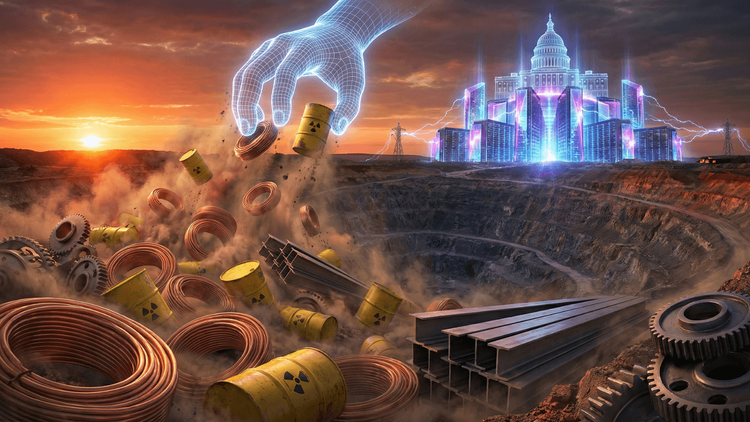Trump Slams 'Slow Moving' Fed While Wall Street Burns
As markets reel and recession fears rise, Trump turns up the heat on the Fed while defending his high-stakes trade war.

As Wall Street stares down a third straight day of steep losses, former President Donald Trump has renewed his call for the Federal Reserve to act swiftly and decisively. In a string of pointed messages shared on his social media platform Truth Social, Trump slammed what he called the "slow moving" Fed, urging Chair Jerome Powell to cut interest rates in the face of crumbling markets and rising economic uncertainty.
With the S&P 500, Nasdaq, and Dow Jones all posting alarming declines and global markets following suit, the pressure on policymakers is intensifying. The sell-off comes on the heels of Trump’s aggressive tariff announcements, which have sparked a cascade of investor panic, renewed recession fears, and a rare alignment of bearish sentiment across the Street.
 Source: Truth Social
Source: Truth Social
A Turbulent Monday on Wall Street
The financial markets woke up to blood red numbers on Monday. The S&P 500 has already plunged nearly 6% for the day, extending its losses past 10% since Thursday. The Nasdaq has officially entered bear market territory with a drop exceeding 20% from recent highs. JPMorgan Chase stock is down over 7%, as banks and tech stocks bear the brunt of the volatility. The Dow Jones Industrial Average followed suit, down more than 5.5%.
Across the Pacific, it wasn’t any better. China’s Hang Seng Index nosedived over 13%, while Japan’s Nikkei 225 fell into a bear market with a single-day drop of 7.8%. Oil prices tanked as well, with West Texas Intermediate crude dipping below $60 a barrel — the lowest level in four years. From Wall Street to Tokyo, markets are in freefall.
Trump’s Blame Game and the Fed's Reluctance
Trump wasted no time pointing fingers. He cited falling oil, food, and interest rates as indicators that inflation is under control, asserting there’s "NO INFLATION" to justify the Fed’s current stance. He accused China — whose markets are also collapsing — of being the "biggest abuser" and dismissed their retaliatory tariffs as evidence of their economic desperation.
In another post, Trump doubled down: “This would be a PERFECT time for Fed Chairman Jerome Powell to cut Interest Rates. He is always 'late,' but he could now change his image, and quickly.”
But Federal Reserve Chair Jay Powell isn’t biting — at least not yet. In a Friday speech, Powell remained cautious, warning of upside risks to inflation and saying it was too early to determine the appropriate path for monetary policy. That cool-headed tone stands in stark contrast to the mounting frenzy in financial markets and the political pressure boiling over.
Tariff Tensions and the Threat of Recession
The backdrop of this financial storm is Trump’s fresh round of sweeping tariffs, which some analysts say could be the straw that breaks the economy’s back. Commerce Secretary Howard Lutnick, appearing on CBS’s Face the Nation, left no ambiguity: “The tariffs are coming… he wasn’t kidding.”
Trump’s tariff war with China, reignited just last week, includes a bold 34% retaliatory tax from Beijing — a move that stunned markets and fueled fears of a full-blown trade war. The White House has shown no indication of reversing course, instead defending the moves as necessary to correct years of economic abuse by foreign competitors.
But Wall Street sees it differently. In a note to clients, Citi's head of U.S. equity strategy Stuart Kaiser cautioned investors, stating there's still “ample space to the downside” for equities. Strategists across multiple banks are now revising their S&P 500 forecasts downward, with whispers of a potential recession growing louder.
The Billionaire Backlash
It’s not just economists raising red flags. Prominent investors are voicing concerns, too. JPMorgan Chase CEO Jamie Dimon, in his annual shareholder letter released Monday, acknowledged the uncertainty triggered by Trump’s tariffs. He warned that while the policies may deliver short-term inflation, they’re more likely to “slow down growth” and damage investor confidence.
Then there’s Bill Ackman. The outspoken hedge fund billionaire, who endorsed Trump following the assassination attempt last summer, took to X (formerly Twitter) with an ominous forecast. “We could be headed for an economic nuclear winter,” he warned, unless Trump hits pause and reconsiders the tariff rollout.
Ackman added on Monday that unless the White House clearly outlines its plan, the "bad math" behind these economic decisions could take down the global economy.
The Fed in the Crosshairs
All eyes are now on Jerome Powell and the Federal Reserve. The markets are screaming for relief — a rate cut, some liquidity, anything to stem the bleeding. But the Fed, still wary of repeating the mistakes of the past, remains hesitant. Officials are concerned that premature rate cuts could ignite inflation once again or signal panic.
The tension between the Fed’s slow-and-steady approach and Trump’s scorched-earth tactics is palpable. While Trump’s base may applaud his tough-on-China stance, investors are looking for stability, not more chaos.
A Test of Economic Strategy and Political Power
This moment is a critical stress test not just for financial markets but for economic policy at large. Trump’s strategy hinges on high-stakes confrontation with global trading partners — a gamble that could reshape the economic landscape for years. Meanwhile, the Fed is caught in a balancing act, trying to preserve credibility, tame inflation, and now — possibly — rescue a tumbling stock market.
With the election campaign heating up and the economy now clearly at risk, this confrontation over interest rates, trade policy, and market intervention could define the months ahead.
Conclusion
Markets are tumbling, investors are panicking, and Trump is on the offensive. Whether the Fed caves to political pressure or holds the line will shape not only the trajectory of this downturn but the broader economic and political climate of 2025. With global markets in turmoil, tariffs rising, and no end in sight, the U.S. economy is entering uncharted territory — and the decisions made in the coming days could have consequences that ripple for years.






